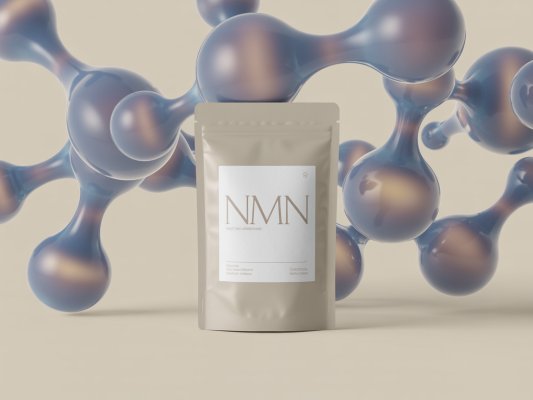
NMN
Description
Nicotinamide Mononucleotide (NMN) is a naturally occurring compound that serves as a precursor to NAD+, a crucial coenzyme in every cell of your body. NMN is believed to play a vital role in energy production, DNA repair, and overall cellular health. This article provides a comprehensive, yet accessible, overview of NMN, including its potential benefits, optimal usage, and the latest research.
Quick Overview: NMN At-a-Glance
- Key Benefit(s): Enhanced physical stamina and cellular anti-aging support.
- Primary Mechanism: Boosts NAD+ levels, essential for cellular function.
- Best For: Individuals seeking to improve energy levels, support healthy aging, and enhance physical performance.
- Typical Dose Range: 250-900mg daily.
- Key Caution/Consideration: Long-term effects are still being studied; consult with a healthcare professional.
Table of Contents
Categories & Effectiveness
Learn about our rating methodologyEnergy & Alertness
Physical Stamina
7/10Strong evidence of effectiveness
Alertness & Vigilance
4/10Moderate evidence of effectiveness
Cellular Energy (ATP)
4/10Moderate evidence of effectiveness
Physical Performance
Physical Endurance
7/10Strong evidence of effectiveness
Systemic Health
Cellular Anti-Aging
7/10Strong evidence of effectiveness
Vascular Health
7/10Strong evidence of effectiveness
Dosage & Side Effects
Recommended Dosage
Avoid exceeding 900mg daily unless under the guidance of a healthcare professional. Those new to NMN should start low, around 250mg, and gradually increase the dosage over several weeks. Pay attention to how your body responds, and adjust accordingly.
Potential Side Effects
Rarely, some individuals have reported neurological symptoms like muscle twitching or brain fog, though these reports are anecdotal and not definitively linked to NMN. If you experience any unusual or severe side effects, discontinue use and consult a healthcare professional.
Bioavailability & Half-Life
Interactions & Stacks
Recommended Products
Anti-Aging Face Moisturizer for Women – Reduces Wrinkles & Fine Lines, Long-Lasting Hydration, Fast Absorbing – Ideal for Dry & Sensitive Skin, Daily Skincare for Youthful Glow
- Rated 5.0 stars by 2 customers
- Premium quality ingredients
VitaCrest Hochreines NADH + Q10 Kapseln, Deutsches Produkt, Vegan, Hochdosiert und Magensaftresistent, mehr Energie und Konzentration
- Rated 4.8 stars by 19 customers
- Premium quality ingredients
NAD+ Nicotinamide Riboside Chloride 300mg - +3 Monate Kur - NAD Booster - Anti-Aging & Gegen Müdigkeit - Made in France - 90 Vegetarische Kapseln - Vegan - Hexagon
- Rated 4.4 stars by 520 customers
- Premium quality ingredients
As an Amazon Associate we earn from qualifying purchases. Prices and availability are accurate as of the date/time indicated and are subject to change.
Benefits by Use Case
Enhanced Physical Endurance
NMN supplementation can improve physical endurance by boosting NAD+ levels, which are essential for energy production in cells. This benefit is particularly noticeable during prolonged exercise or physical activity. However, individual results may vary depending on fitness level and overall health.
Research Finding:
In middle-aged runners, supplementing 600 to 1200 mg/day of NMN for six weeks increases the aerobic capacity of humans during exercise training.
Support Healthy Aging
NMN supports healthy aging by increasing NAD+ levels, which decline with age and are vital for cellular repair and function. By replenishing NAD+ levels, NMN may help mitigate age-related decline. However, long-term effects and optimal dosage for anti-aging are still under investigation.
Research Finding:
NMN enhances quality of life, enhances physical performance, and slows down aging by increasing NAD. The effects become more pronounced at greater dosages.
Mechanism of Action
Frequently Asked Questions
Where to Buy NMN
Based on quality, price, and customer reviews, here are our top recommended NMN supplements:
Anti-Aging Face Moisturizer for Women – Reduces Wrinkles & Fine Lines, Long-Lasting Hydration, Fast Absorbing – Ideal for Dry & Sensitive Skin, Daily Skincare for Youthful Glow
- Rated 5.0 stars by 2 customers
- Premium quality ingredients
Liposomales NAD+ Trans-Resveratrol 800 mg Softgels, überlegene Alternative, Effizienter als NR, Hohe Absorption, 60 Softgels (60 Stück (1er Pack))
- Rated 4.3 stars by 1,031 customers
- Premium quality ingredients
NAD+ Nicotinamide Riboside Chloride 300mg - +3 Monate Kur - NAD Booster - Anti-Aging & Gegen Müdigkeit - Made in France - 90 Vegetarische Kapseln - Vegan - Hexagon
- Rated 4.4 stars by 520 customers
- Premium quality ingredients
As an Amazon Associate we earn from qualifying purchases. Prices and availability are accurate as of the date/time indicated and are subject to change.
Summary & Expert Opinion
- Key Strengths: Potential to improve energy levels, support healthy aging, and enhance physical performance.
- Key Weaknesses: Long-term effects are not fully understood, and individual responses can vary.
- Recommendation: Start with a low dose, monitor your body's response, and consult with a healthcare professional for personalized guidance.
Detailed Technical Analysis:
NMN's mechanism of action centers on its conversion to NAD+, a critical coenzyme involved in hundreds of metabolic processes. NAD+ acts as an electron carrier in redox reactions, essential for energy production within the mitochondria. Specifically, NAD+ is a substrate for enzymes like sirtuins and PARPs, which play key roles in DNA repair, gene expression, and cellular senescence.
The pharmacokinetics of NMN are still being elucidated. While studies show it's rapidly absorbed, the exact pathways and tissue distribution are complex. Factors like the efficiency of the NMN transporter SLC12A8 and the activity of enzymes involved in NAD+ synthesis can influence individual responses.
Conflicting study results highlight the need for more rigorous research. Some studies show significant benefits, while others report more modest effects or high individual variability. Methodological limitations, such as small sample sizes and short durations, contribute to these discrepancies. Genetic factors, such as variations in genes encoding NAD+ biosynthetic enzymes, may also influence individual responses.
Long-term effects and potential risks require further investigation. While studies show NMN is generally safe in the short term, the long-term consequences of sustained NAD+ elevation are not fully understood. Potential concerns include the impact on cancer cell growth and the dysregulation of other metabolic pathways.
For those interested in NMN supplementation, it's crucial to approach it with a balanced perspective. While NMN shows promise as a potential anti-aging and performance-enhancing agent, more research is needed to fully understand its long-term effects and optimize its use.








